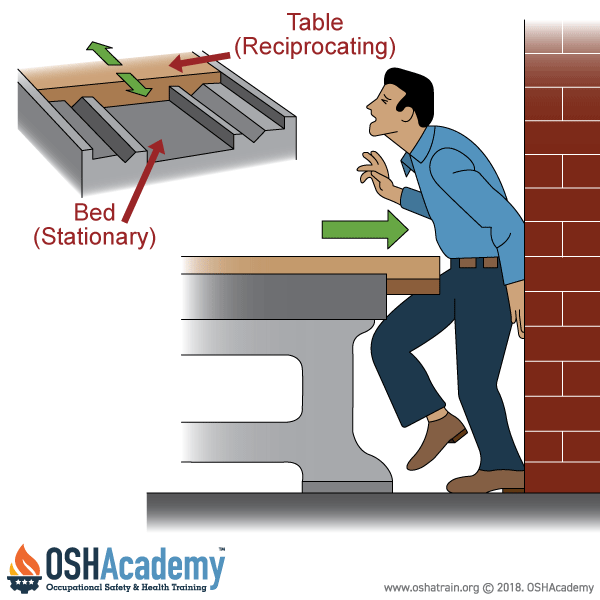Motions
Reciprocating Motions
Reciprocating motions involve repetitive back-and-forth or up-and-down movements of machine parts, such as pistons, rams, or blades.
These motions are hazardous because a worker may be struck by the moving part or caught between it and a stationary component, leading to severe injuries like crushing, pinching, or even amputations. The danger is amplified when workers are unaware of the machine’s cycle, lack proper guarding, or perform maintenance without locking out the equipment.
Key Features of Reciprocating Motions
The key feature of reciprocating motions include the following:
- Move in a straight line, reversing direction at regular intervals.
- Common in equipment like hydraulic presses, saws, and press brakes.
- Create hazards where body parts can be struck, pinched, or crushed between moving and stationary parts.
- Often operate on timed or automatic cycles, increasing risk if workers misjudge timing or bypass controls.
Examples
- Hydraulic Press Rams: Hydraulic presses used in manufacturing for stamping or forming metal involve a ram that moves up and down. If a worker reaches into the press area to adjust a workpiece without stopping the machine, the descending ram can crush hands or arms. A real-world example includes a factory worker losing fingers due to premature activation of the press during setup.
- Power Press Brakes: In metalworking, press brakes use reciprocating motion to bend sheet metal. Workers feeding material into the machine risk having their hands caught in the closing gap, leading to crushing or amputation. An example is a worker bypassing safety guards to speed up production, resulting in severe hand injuries when the brake cycles unexpectedly.
To mitigate these risks, employers should install physical guards, use two-hand controls to ensure workers’ hands are clear of danger zones, and enforce strict lockout/tagout procedures during maintenance. Workers must be trained to recognize the hazards of reciprocating motions and avoid reaching into active machine areas.
Knowledge Check Choose the best answer for the question.
1-5. Why are reciprocating machine parts dangerous to workers?
You forgot to answer the question!

